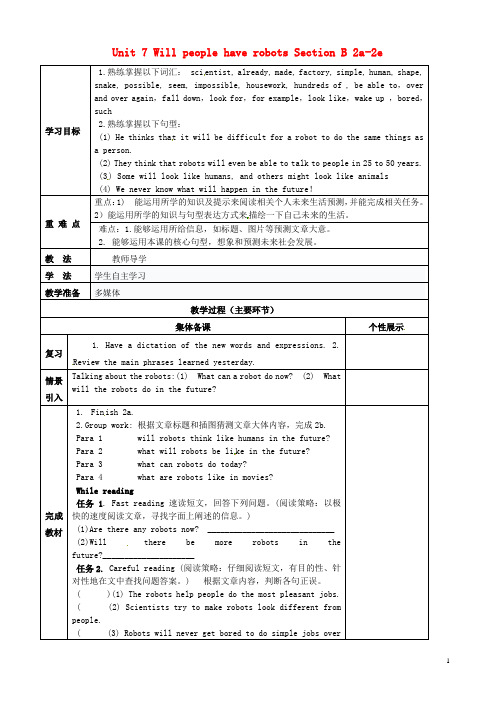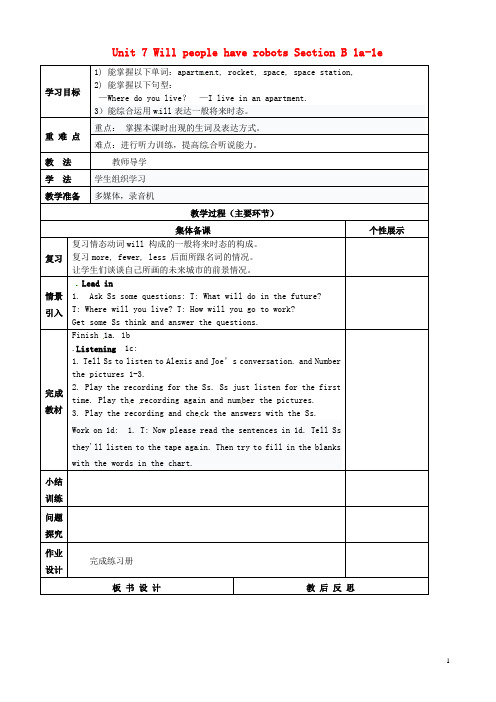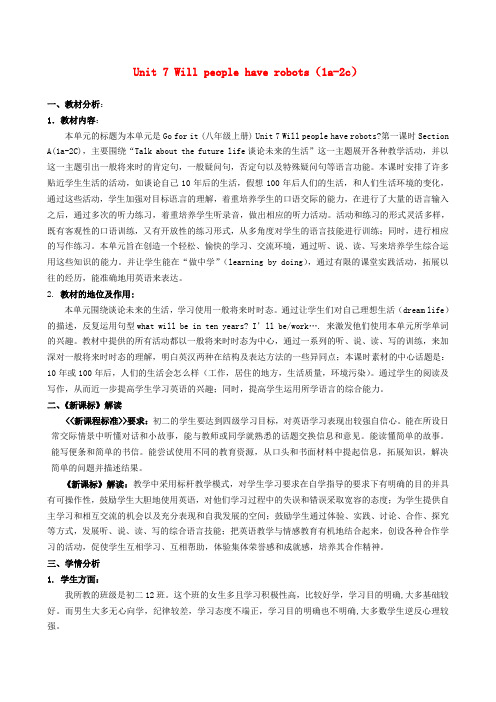八年级英语上册 Unit 7 Will people have robots Section A备课资料教案 (新版)人教新目标版
[推荐学习]八年级英语上册 Unit 7 Will people have robots学案 (新版
![[推荐学习]八年级英语上册 Unit 7 Will people have robots学案 (新版](https://img.taocdn.com/s3/m/18506bc2f8c75fbfc77db27d.png)
第三课时
第一学段
sectionA(2a-2c)名词的单复数变化及there be结构的运用。
1.C层学生掌握there be够与一般将来时的综合运用。
2.A、B层学生能知道那个是可数名词,那个是不可数名词。
1.独学:自主解决句子中的单词。
Will people have robots
课题学习目标
1.知识目标:熟记P49-56单词、词组,掌握并学会运用这些词、词组编写对话。
2.能力目标: 学会用一般将来时态来谈论未来的打算。
3.情感目标:能用一般将来时态描述将来的计划或打算,并与对子之间对话交流。
学法概述
1.单词的解决:通过学生自主拼读,对子之间相与盯读,组长领读,掌握单词的读法、词性和词义。
评比哪一组学的快。让其他小组给各小组打分。
第三学段
sectionA(1c)
1.A、B层学生熟读并能默写对话,且能划出句式结构及重要短语。
2.C层学生背诵对话。
1.独学:单个速读句子、查找不认识的单词。
2.对学:对子之间互相翻译句子并对话练习。
3.群学:小组组长对本小组预习成果对小组组员汇报。
15分钟
第二学段
sectionA(1a)
1.A、B层学 生能够熟读句 子并能正确翻译,且找出句子中的句式结构和重要单词短语。
2. C层学生能够熟练翻译句子并熟记重要词组。
1.独学:单个速读句子、查找不认识的单词。
2.对学:对子之间互相翻译句子。
3.群学:小组组长对本小组预习成果在黑板上汇报。
10分钟
师傅带徒弟活动。5分钟
第三学段
对单元标题进行分析。
八年级英语上册 Unit 7 Will people have robots Section B 2a-2e教学案(无答案)(新版)人教新目标版

(4) We never know what will happen in the future!
重难点
重点:1)能运用所学的知识及提示来阅读相关个人未来生活预测,并能完成相关任务。2)能运用所学的知识与句型表达方式来 描绘一下自己未来的生活。
( (3) Robots will never get bored to do simple jobs over and over again.
( (4) Humans will have more work to do it the future.
( (5) Space rockets seemed possible a hundred ye ars ago.
Unit 7 Will people have robots Section B2a-2e
学习目标
1.熟练掌握以下词汇:sci entist, already, made, factory, simple, human, shape, snake, possible, seem, impossible, housework, hundreds of , be able to,over and over again,fall down,look for,for example,look like,wake up,bored,such
While reading
任务1. Fast reading速读短文,回答下列问题。(阅读策略:以极快的速度阅读文章,寻找字面上阐述的信息。)
(1)Are there any robots now? _____________________________
八年级英语上册 Unit 7 Will people have robots Section B 1a-1e教学案(无答案)(新版)人教新目标版

问题探究
作业设计
完成练习册
板书设计
教后反思
1.words:
apartment, rocket, space, space s tatio you live?
I live in an apartm ent.
Unit 7 Will people have robots Section B1a-1e
学习目标
1)能掌握以下单词:apartm en t, rocket, space, space station,
2)能掌握以下句型:
—Where do you live?—I live in an apartment.
3)能综合运用w ill表达一般将来时态。
重难点
重点:掌握本课时出现的生词及表达方式。
难点:进行听力训练,提高综 合听说能力。
教法
教师导学
学法
学生组织学习
教学准备
多媒体,录音机
教学过程(主要环节)
集体备课
个性展示
复习
复习情态动词will构成的一般将来时态的构成。
复习more, fewer, less后面所跟名词的情况。
完成教材
Finish 1a. 1b
.Listening1c:
1. Tell Ss to listen to Alexis and Joe’s conversation. and Number the pictures 1-3.
2. Play the recording for the Ss. Ss just listen for the first time. Play th e recording again and num ber the pictures.
人教版2020年八年级英语上册Unit7Willpeoplehaverobots讲义(新版)人教新目标版

Unit 7 Will people have robots? (讲义) Words and expressionspaper /'peɪpə(r)/ n. 纸;纸张pollution /pə'luːʃn/ n. 污染;污染物prediction /prɪ'dɪkʃn/ n. 预言;预测future /'fjuːtʃə(r)/ n. 将来;未来pollute /pə'luːt/ v. 污染environment /ɪn'vaɪrənmənt/ n.环境planet/'plænɪt/ n. 行星earth /ɜː(r)θ/n. 地球;世界plant /plɑːnt/ v. 种植n. 植物part /pɑː(r)t/ n. 参加;参与;部分play a part 参与(某事)peace /piːs/ n. 和平sea /siː/ n. 海;海洋sky /skaɪ/ n. 天空astronaut /'æstrənɔːt/ n. 宇航员;航天员apartment /ə'pɑː(r)tmənt/ n. 公寓套房rocket /'rɒkɪt/ n. 火箭space /speɪs/ n. 太空;空间space station 太空站;宇宙空间站human /'hjuːmən/ adj. 人的n. 人servant /'sɜː(r)vənt/ n. 仆人dangerous /'deɪndʒərəs/ adj. 有危险的;不安全的already /ɔːl'redi/ adv.已经;早已factory /'fæktəri/ n. 工厂over and over again 多次;反复地believe /bɪ'liːv/ v.相信;认为有可能disagree /,dɪsə'griː/ v.不同意;持不同意见;有分歧even /'iːvn/ adv.甚至;连;愈加hundreds of 许多;大量shape /ʃeɪp/ n. 形状;外形fall /fɔːl/ v. (fell /fel/) 倒塌;跌倒;掉落fall down 突然倒下;跌倒;倒塌inside /ɪn'saɪd/ adv. & prep. 在……里面look for 寻找;寻求possible /'pɒsəbl/ adj. 可能存在或发生的;可能的impossible /ɪm'pɒsəbl/ adj. 不可能存在或发生的;不可能的side /saɪd/ n. 一方(的意见、态度、立场)probably /'prɒbəbli/ adv.很可能;大概during /'djʊərɪŋ/ prep. 在……期间holiday /'hɒlədeɪ/ n. 假期;假日word /wɜː(r)d/ n. 单词;词Nick /nɪk/ 尼克(男名)James /dʒeɪmz/ 詹姆斯(男名)White /waɪt/ 怀特(姓)Role-playNick: What are you reading, Jill?Jill: It’s a book about the future.Nick: Sounds cool. So what will the future be like?Jill: Well, cities will be more crowded and polluted. There will be fewer trees and the environment will be in great danger. Nick: That sounds bad! Will we have to move to other planets? Jill: Maybe. But I want to live on the earth.Nick: Me, too. Then what can we do?Jill: We can use less water and plant more trees. Everyone should play a part in saving the earth.Grammar focus’ll=willwon’t=will not3a Fill in the blanks with more, less or fewer.1.In the future, there will be fresh water because there will bepollution in the sea.2.In 100 years, there will be cars because there will bepeople in the cities.3.There will be jobs for people because robotswill do the same jobs as people.4.I think there will be cities because people will buildbuildings in the country.5.In 50 years, people will have free time because therewill be things to do.Reading2b Read the article and match each paragraph with the questionsit discusses.Paragraph 1 Will robots think like humans in thefuture? Paragraph 2 What will robots be like in the future? Paragraph 3 What can robots do today?Paragraph 4 What are robots like in movies?Do You Think You Will Have Your Own Robot?1.When we watch movies about the future, we sometimes see robots. Theyare usually like human servants. They help with the housework and do jobs like working in dirty or dangerous places.2.Today there are already robots working in factories. Some can helpto build cars, and they do simple jobs over and over again. Fewer people will do such jobs in the future because they are boring, but robots will never get bored.3.Scientists are now trying to make robots look like humans and dothe same things as we do. Some robots in Japan can walk and dance.They are fun to watch. However, some scientists believe that although we can make robots move like people, it will be difficult to make them really think like a human. For example, scientist James White thinks that robots will never be able to wake up and know where they are. But many scientists disagree with Mr. White. They think that robots will even be able to talk like humans in 25 to 50 years.4.Some scientists believe that there will be more robots in the future.However, they agree it may take hundreds of years. These new robots will have many different shapes. Some will looks like humans, and others might look like animals. In India, for example, scientists made robots that look like snakes. If buildings fall down with people inside, these snake robots can help look for people under thebuildings. This was not possible 20 years ago, but computers and rockets also seemed impossible 100 years ago. We never know what will happen in the future!Exercises一、填空1.Our (环境) will be better if we protect it.2.The (预言) didn’t come true.3.His uncle is an (宇航员).4.He worked in a (太空站) last year.5.There are five (仆人) in his family.6.Tom was surprised by all the (pollute) on the beach.7.We hope the world will be (peace).8.Be away from the tiger. It’s(danger).9.It’s too late. I (agree) that we go there today.10.It seems (possible) that people can fly.二、单选( )11. Please pass me two .A.pieces of paperB. pieces of papersC. pieces paperD. piece papers( )12. Let’s play a part the room.A. cleanB. cleaningC. to cleanD. in cleaning( )13. volunteers will give out leaflets(传单) to ask people to protect the wetlands(湿地).A. Two hundredsB. Hundreds ofC. Two hundred ofD. Hundred of( )14. , Tom! It’s time to get up and go to school.A. Wake upB. Make upC. Grow upD. Look up ()15. John will go to France on vacation this summer.A. possibleB. impossibleC. probablyD. probable( )16. It is difficult for a robot _ thesame things aperson does.A. doing; likeB. do; fromC. to do; asD. does; as( )17. —What are you doing in the room?—I’m my hat.A. looking afterB. looking forC. looking upD. looking like( )18. There are some students the classroom.A. cleanB. to cleaningC. cleaningD. cleans( )19. There are many clouds _ the sky.A. inB. onC. atD. to( )20. I think the movie is interesting. But he disagrees me.A. inB. withC. toD. of( )21. It’s7 p.m., but the children are not backyet.A. alsoB. eitherC. alreadyD. only( )22. If there are people driving, there will be _air pollution.A. less; lessB. less; fewerC. fewer; fewerD. fewer;less( )23. —Willthere be schools in the future?—I think students will study at home on the Internet.A. Yes, there will.B. No, there won’t.C. Yes, there is.D. No, there isn’t.三、翻译24.你同意将来会有更多的污染吗?Do you that there will be more pollution?25.你能告诉我未来是什么样子吗?Can you tell me what the ? 26.你必须反复地练习才能做得很好。
八级英语上册Unit7WillpeoplehaverobotsSectionA(1A2d

Hale Waihona Puke A: Do you think there will be robots in people’s homes?
___A___D 1. People will have robots in their homes. ___A___D 2. People won’t use money. Everything will be free. ___A___D 3. Books will only be on computer, not on paper. ___A___D 4. Kids won’t go to school. They’ll study at home on
computers. ___A___D 5. There will only be one country. ___A___D 6. People will live to be 200 years old.
1b Listen and circle the predictions you hear in 1a.
B: Yes, there will. I think every home will have a robot.
A: Will kids go to school? B: No. Kids won’t go to school. They will
study at home on computers. …
2a Listen and circle the words you hear.
八年级英语上册 Unit 7 Will people have robots(1a-2c)教材分析

Unit 7 Will people have robots(1a-2c)一、教材分析:1.教材内容:本单元的标题为本单元是Go for it (八年级上册) Unit 7 Will people have robots?第一课时Section A(1a-2C),主要围绕“Talk about the future life谈论未来的生活”这一主题展开各种教学活动,并以这一主题引出一般将来时的肯定句,一般疑问句,否定句以及特殊疑问句等语言功能。
本课时安排了许多贴近学生生活的活动,如谈论自己10年后的生活,假想100年后人们的生活,和人们生活环境的变化,通过这些活动,学生加强对目标语言的理解,着重培养学生的口语交际的能力,在进行了大量的语言输入之后,通过多次的听力练习,着重培养学生听录音,做出相应的听力活动。
活动和练习的形式灵活多样,既有客观性的口语训练,又有开放性的练习形式,从多角度对学生的语言技能进行训练;同时,进行相应的写作练习。
本单元旨在创造一个轻松、愉快的学习、交流环境,通过听、说、读、写来培养学生综合运用这些知识的能力。
并让学生能在“做中学”(learning by doing),通过有限的课堂实践活动,拓展以往的经历,能准确地用英语来表达。
2. 教材的地位及作用:本单元围绕谈论未来的生活,学习使用一般将来时时态。
通过让学生们对自己理想生活(dream life)的描述,反复运用句型what will be in ten years? I’ll be/work…. 来激发他们使用本单元所学单词的兴趣。
教材中提供的所有活动都以一般将来时时态为中心,通过一系列的听、说、读、写的训练,来加深对一般将来时时态的理解,明白英汉两种在结构及表达方法的一些异同点;本课时素材的中心话题是:10年或100年后,人们的生活会怎么样(工作,居住的地方,生活质量,环境污染)。
通过学生的阅读及写作,从而近一步提高学生学习英语的兴趣;同时,提高学生运用所学语言的综合能力。
八年级英语上册 Unit 7 Will people have robots(第1课时)Sectio
3
3.未来会是什么样的呢? What will the future be
like?
4
Ⅰ.根据句意和汉语提示写单词。 1.People put the rubbish(垃圾) into the river and there is much pollution (污染). 2.Please write your name and phone number on a piece of paper (纸). 3.The park is a good environment (环境) for children and old people.
Unit 7 Will people have robots? 第一课时 Section A (1a—2d)
1
重点短语翻译 1.活到…… live to be 2.在 100 年后 in 100 years 3.空闲时间 free time 4.在危险中 in danger 5.在地球上;在世界上 on the earth 6.参与……中 play a part in 7.在将来 in the future
hour ago and they will be back
about two hours.
A.after
B.in
C.for
D.at
【解析】in+时间段,通常用于一般将来时。
12
( C )15.The students in that school learn
English
computers.
A.at
5
4.What will you be like in the future (将来)? 5.Spring is the best time to plant (种植) trees.
八年级英语上册Unit7Willpeoplehaverobots(第1课时)单词课教案人教新目标版
Will people have robots?New words and phrasesTeaching and Learning Goals(教学目标):一、知识和能力目标:1。
能争取学会使用下列词汇造句子(Curriculum words)paper, pollution, future, environment, planet, earth, plant, part, peace,sea, sky, apartment, space, human, dangerous, already, factory, believe,disagree, even, shape, fall, inside, possible, probably, word2. 能争取学会使用下列常用短语造句子(Useful expressions)play a part, over and over again, hundreds of, fall down, look for,during the holiday,3。
能认读下列词汇(non—curriculum words)prediction, astronaut, rocket, servant二、学习策略Remember the Curriculum words and phrases according to the specific situations。
(在语境中记忆单词)三、情感目标:Protect the environment (保护环境)Teaching and Learning Steps(教学步骤):Step 1 Learn to read the words and phrases on P127-128。
1。
Read the new words using the phonetics(音标)and underline the words difficult to pronounce (难发音的单词)。
八年级英语上册 Unit 7 Will people have robots全单元课件 (新版)人教新目标版
1c
Will people use money in 100 years?
No, they won’t. Everything will be free.
Yes, they will.
Will people live to be 200 years old?
Will kids go to school?
People will live to be 200 years old.
How will the world be different in 1a the future, 100 years from now? Read these predictions. Check (√) A (for agree) or D (for disagree).
on the earth.
Nick: Me, too. Then what can we do?
Jill: We can use less water and plant more trees.
Everyone should play a part in saving the
earth.
play a part in… 是一个固定短语,表示 “参与……;在……中尽自己的一份力 量” e.g. He didn’t play a part in making this decision. 他并没参与做出此决定。
2011
2013
2015
I’m thirteen years old now. And I will be fifteen years old in two years. 现在我十三岁,两年后我将是十五岁。
Hale Waihona Puke 1. will + 动词原形 e.g. Books will be on computers.
- 1、下载文档前请自行甄别文档内容的完整性,平台不提供额外的编辑、内容补充、找答案等附加服务。
- 2、"仅部分预览"的文档,不可在线预览部分如存在完整性等问题,可反馈申请退款(可完整预览的文档不适用该条件!)。
- 3、如文档侵犯您的权益,请联系客服反馈,我们会尽快为您处理(人工客服工作时间:9:00-18:30)。
1
Unit 7 Will people have robots? Section A
1.Do you think there will be robots in people’s homes?
你认为人们家里将会有机器人吗?
⑴这是一个含有宾语从句的主从复合句。Do you think为主句,there will be...是省略了连接词
that的宾语从句,从句要用陈述语序。
⑵there will be是There be句型的一般将来时,意为“将会有……”。
There be
句型的一般将来时
There will be a football match in Bird Nest this Sunday.
周日在鸟巢将有一场足球比赛。
There won’t be Kung Fu Panda 2 in the cinema tomorrow.
明天在这家电影院不会上映《功夫熊猫2》。
—Will there be more trees in the future? 将来会有更多的树吗?
—Yes,there will./No,there won’t. 是的,会有。/不,不会。
2.I think every home will have a robot.
我认为每个家庭都将有一个机器人。
⑴这是一个含宾语从句的主从复合句,I think是主句,every home will have a robot是宾语从句。
I think that+从句时,若从句为否定句,要将否定前移到主句中,即I don’t think that+从句。
⑵【辨析】every与each
every 指三个或三个以上的人或物中的每一个,强调整体,只作定语修饰单数名词
each
指两个或两个以上的人或物中的每一个,强调个体,可以作定语修饰名词,也可以作主语、宾
语和同位语
Every student passed the exam.
每个(所有)学生考试都及格了。
Each student has a desk and a chair.
每个学生都有一张课桌和一把椅子。
There are trees on each side of the road.
2
路的两边都有树。
Each of us has something to say.
我们每一个人都有话要说。
Give them two each.给他们每人两个。
3.Books will only be on computers,not on paper.
书只会在电脑上出现,而不会在纸上。
paper此处用作不可数名词,意为“纸;纸张”。表示“一张纸”用a piece of paper,“两张纸”
用 two pieces of paper。如:
Can you give me two pieces of paper?
你能给我两张纸吗?
4.Will people use money in 100 years?100年后人们将还使用钱吗?
⑴in 介词,意为“在……之后”。“in+一段时间”意为“多久之后”,表示以现在为起点的一段时
间以后,常用于一般将来时的句子中。
We will be back in an hour.一小时后我们会回来。
—How soon will you come back home?你多久回家?
—In half an hour.半小时后。
⑵【辨析】in与after
in
“in+一段时间”表示“从现在算起的一段时间以后”,也可以表示“在将来多长时间之
内”,常与一般将来时连用
after
“after+一段时间”,以过去时间点为起点,表示“过去一段时间以后”,常与一般过去时连
用
My uncle will come back from New York in three days.
我叔叔将在3天后从纽约回来。
Tom started on Sunday and arrived in Lhasa after four days.汤姆在周日出发,4天后到达了
拉萨。
5.There will be(more/less/fewer) pollution.将会有(更多/更少/更少的)污染。
⑴【辨析】more, less与fewer
more
作many的比较级时,修饰可数名词,反义词为fewer;作much的比较级时,修饰不可数名词,
反义词为less
3
less 意为“更少;较少的”,是little的比较级,只能修饰不可数名词
fewer 意为“更少;较少的”,是few的比较级,只能修饰可数名词
There will be more people in 10 years.
十年后会有更多的人。(many的比较级)
There will be more free time in the future.
将来会有更多的闲暇时间。(much的比较级)
Eat less meat. 少吃肉。
Try to make fewer mistakes. 尽量少犯错误。
⑵pollution不可数名词,意为“污染;污染物”。如:
air pollution空气污染 noise pollution噪音污染
【拓展】pollution的动词形式是pollute,意为“污染;弄脏”,其过去式为polluted,现在分词为
polluting。
6.What’s your prediction about the future?关于未来你的预言是什么?
future名词,意为“将来;未来”。常用短语:in the future意为“在将来;以后”,特指将来的某一
时刻。如:
Who knows what will happen in the future?
谁知道将来会发生什么事?
【拓展】in future指从今以后的全部将来,相当于from now on。如:
In future you’d better get his permission first.
从今以后你最好首先得到他的同意。
7.We can use less water and plant more trees.我们可以少用水,多栽树。
plant此处用作及物动词,意为“种植;栽种;栽培”。如:
They planted lots of trees last year.
去年他们种了很多树。
【辨析】plant与grow
plant
表示“种植”,一般指“栽入土中”,即“栽上”或“种下”,是一种涉及时间较短的动作或活动 Don’t plant the
flowers before
4
mid-April.
这些花不要在四月中
旬以前栽种。
grow
表示“种植”,包含“种下”及以后培育的过程,涉及时间较长,可看作是一种过程或状态 My uncle’s job is to grow flowers.
我叔叔的工作就是种
花。
8.Everyone should play a part in saving the earth.
每个人都应该参与到拯救地球的行列当中去。
play a part in 意为“参与某事;在……方面起作用”,后可接名词、代词或动词的-ing形式。如:
Education can play a part in it.
教育可以在其中起到作用。
英语笑话
A woman gets on a bus with her baby. The driver says: "Ugh, that's the ugliest baby I've
ever seen."
一位女士抱着她的宝宝上公交车,司机看到后说:“额,那是我这辈子见过的最丑的小孩。”
The woman walks to the rear of the bus and sits down, fuming. She says to a man next
to her: "The driver just insultedme." The man says: "You go up there and tell him off.
Go on, I'll hold your monkey for you."
女士走到车厢后面坐下,感到很愤怒。她对旁边的男士说:“司机刚刚羞辱了我。”男士回应说:
“你快上去斥责他。去吧,我替你抱着你的猴子。”
【注释】
1. fume - to be angry about something 发怒,生气
常用介词搭配:fume at/over/about
例如:fume about what he said 对他所说的话感到生气
2. tell somebody off 斥责,责骂
5
tell somebody off for doing something 因为某人做某事而责骂他/她
例如:The boss is always telling me off for being late, even though he is late every day! 我
的老板总拿迟到的事斥责我,即便他自己天天迟到!此资源为word格式,您下载后可以自由编辑,
让智慧点亮人生,用爱心播种未来。感谢您的选用。
